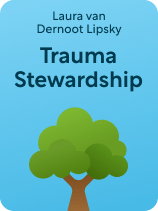

This article is an excerpt from the Shortform book guide to "Trauma Stewardship" by Laura van Dernoot Lipsky. Shortform has the world's best summaries and analyses of books you should be reading.
Like this article? Sign up for a free trial here.
Do you care for trauma patients? What are the signs of secondary trauma?
According to Laura van Dernoot Lipsky’s book Trauma Stewardship, people have different responses to trauma exposure. If you work with trauma patients, you must understand how secondary trauma affects you so you can better care for others.
Let’s look at eight secondary trauma symptoms that you may be experiencing.
Sign #1: Feeling Like Your Actions Don’t Matter
Lipsky explains that the first secondary trauma symptom many people regularly exposed to other people’s trauma develop a sense of helplessness. A major difficulty when working with trauma sufferers is that the source that causes the trauma rarely goes away. The magnitude of colossal crises such as homelessness or the threat of extinction can feel impossible to combat as an individual and causes people to feel overwhelmed. Thus, carers may feel like they’re unable to make a real difference and think that their efforts are never enough.
(Shortform note: Feeling like your actions don’t matter can lead to depression. In Learned Optimism, Martin Seligman discusses how he conducted an experiment where people were told they could press buttons to stop an unpleasant noise. The buttons didn’t work for some subjects, and their inability to silence the noise caused them to exhibit some symptoms of depression like resignation and lethargy. If you think your actions don’t matter, ask someone to say your thoughts out loud—for example, “You can’t do anything to change your circumstances.” Then, practice defending yourself against the thought. Hearing another person express your beliefs can help you view them differently and recognize how unreasonable they might be.)
Sign #2: Feeling Angry or Fearful
Lipsky writes that witnessing the trauma of others can cause you to build up feelings of anger and fear. She explains that these feelings are natural but that most of us haven’t been taught proper ways to process them. As a result, we often try to suppress them rather than address them—for example, by responding with cynical humor that helps us avoid our feelings rather than understand and work through them.
Fear and anger limit our ability to navigate and approach trauma with nuance and sensitivity because they influence our actions. When we allow fear and anger to continue influencing how we approach new situations, we risk taking those emotions out on others—for example, rather than take productive measures to help others, we might always look for someone to blame or withdraw from situations that make us feel vulnerable.
Sign #3: Feeling Guilty
According to Lipsky, another common sign of secondary trauma is feeling guilty about enjoying your life. If you’re frequently surrounded by people experiencing hardship, you might feel guilty about the good things in your life because you’re aware that many others are suffering. Lipsky writes that this guilt is a sign that you’ve blurred the lines between yourself and others, which can make it harder for you to enjoy the people, things, and experiences you’d otherwise derive happiness from.
(Shortform note: When you feel guilty about the good things in your life, you’re experiencing happiness guilt, which is similar to survivor’s guilt (the guilt you feel when you survived a traumatic event when others didn’t). Experts say that happiness guilt is a “meta-emotion”—an emotion you have in response to another emotion (in this case, happiness). Not allowing yourself to feel certain emotions can lead to negative feelings and depressive symptoms. Instead, embrace your happiness by taking time to celebrate, and use it for good by letting it energize you at work.)
Sign #4: Feeling Constant Exhaustion
According to Lipsky, another sign that you may be experiencing secondary trauma is that your physical, emotional, and mental reserves are always drained. In fact, many have the misconception that putting in good work means that you should be exhausted at the day’s end. Often, this belief causes people to accept unreasonable workloads or responsibilities. However, Lipsky argues that this self-sacrificial way of thinking makes it harder to provide quality care. When you push yourself past your limits, the quality of your work decreases as you lack the energy to navigate traumatic environments with sensitivity and care.
(Shortform note: The constant physical, mental, and emotional exhaustion of secondary trauma can be thought of as burnout. In Burnout, Amelia and Emily Nagoski define burnout as a state of exhaustion caused by excessive stress, in which you feel inadequate and struggle to care about things or connect with other people. They add that women often experience burnout because patriarchal societies expect them to devote time and energy to supporting others in addition to supporting themselves.)
Sign #5: Struggling to Detach From Work
Lipsky states that people who work regularly with trauma sufferers often find it hard to leave work when the day is done. The cause and the people you’re helping feel too important to detach for even a minute. However, when you become overly focused on your job, Lipsky explains, you neglect the aspects of your life that are equally important, such as your relationships and your health. Let’s look at four ways work can become all-consuming.
- You become hypervigilant of danger: People experiencing secondary trauma often remain in a hyper-alert state to try to anticipate threats and prevent anything bad from happening.
- You experience moments of dissociation: You regularly tune out of the present moment and lose track of what you’re doing because you’re recalling a traumatic event.
- Work becomes your source of self-worth: You become obsessed with your work because helping others and making a difference makes you feel like you’re important.
- You avoid everything: When work becomes so draining, some people grow to dread it and try to avoid it entirely. You might wish an excuse would come up so you don’t have to show up to work. Lipsky argues that avoidance can become a habit: You might feel like your personal life is just as draining as your work and start to isolate yourself from family, friends, and positive activities.
Sign #6: Struggling to See Nuance
Lipsky writes that trauma exposure can cause people to view people and situations in simplistic ways and develop polarized opinions. When trauma work leaves you drained mentally and physically, you lack the capacity to consider things deeply and from different perspectives. This might lead you to see things only in black-and-white or label things and people as “good” or “bad.” Lipsky explains that while some trauma sufferers adopt this generalized way of thinking to feel a sense of certainty and security about themselves and their environment, this way of thinking can prevent you, as a caregiver, from navigating situations with sensitivity and without judgment.
Beyond diminishing your capacity for complex thought, secondary trauma reduces your ability to think creatively, which in turn impacts your ability to come up with innovative solutions and make good decisions. According to Lipsky, this is because you can only be creative and entertain many possible options when you’re relaxed. However, the more you get wound up in the trauma of others, the harder it is to relax.
Sign #7: Struggling to Be Compassionate
According to Lipsky, people who regularly work with suffering and loss become desensitized to it. They no longer feel emotionally moved by the pain experienced by others. This desensitization makes it harder for them to be compassionate listeners. Instead of listening with an open mind, they might compare the hardships of different people and minimize those that are less severe. This subconscious act prevents them from giving the same compassion and attention to all people in need of support.
(Shortform note: Beyond desensitization, another symptom of secondary trauma, the silencing response, also hinders a caregiver’s ability to show compassion. This occurs when caregivers try to avoid feeling distressing emotions by unintentionally silencing those they’re caring for. Rather than being unaffected by other people’s painful experiences, they feel overwhelmed by them and close off their ability to listen as a coping mechanism. This response manifests in different ways, causing trauma workers to change topics, minimize situations with humor, and struggle to pay attention.)
Sign #8: Struggling With Addiction
Lipsky explains that many people experiencing secondary trauma also struggle with addictions. She elaborates that trauma workers often turn to drinking alcohol, playing video games, or overworking themselves to avoid coping with difficult feelings they’ve developed from their trauma work. These distractions, however, are only temporary and, over time, deplete their ability to cope with emotions and be present when helping others.
(Shortform note: In Dopamine Nation, Anna Lembke explains why addiction is a common coping mechanism: Your brain uses the same parts to process both pain and pleasure, so you can only feel one or the other at a time. As a result, when people do immediately pleasurable activities (like drinking or video games), they don’t feel pain. However, Lembke argues that the brain is always seeking balance, so each time you repeat that pleasurable experience, it brings you less pleasure because your suppressed pain has been building up. When you stop doing that pleasurable activity, you experience discomfort that drives you to resume it. When you keep relying on an activity to relieve pain, you become addicted to it.)

———End of Preview———
Like what you just read? Read the rest of the world's best book summary and analysis of Laura van Dernoot Lipsky's "Trauma Stewardship" at Shortform.
Here's what you'll find in our full Trauma Stewardship summary:
- That the best way to care for others is to care for yourself
- How trauma damages the caregivers who are exposed to others' trauma
- How caregivers can manage secondary trauma to better support others






